BusinessNow: Live coverage of financial markets and companies, plus analysis and opinion
JP Morgan is worried about the downward trend in earnings revisions and a weaker Aussie dollar.
- Time to sell Australian stocks: JPM
- Dick Smith CEO ‘out of his depth’
- Save your rate cuts, RBA
- 25 years without a recession
- Bargain hunters chase aged care stocks
- China owns a measly 0.38% of Aussie farmland
Welcome to the BusinessNow blog for Wednesday, September 7. GDP figures show annual growth has risen at its fastest clip in four years, while bargain hunters are snapping up aged care stocks.
8.28pm: What to expect from the ECB?
Should the European Central Bank give another push to an economy that’s not rolling fast enough to raise excessively low inflation?
That’s the question facing the bank’s 25-member governing council when it meets on Thursday at its skyscraper headquarters in Frankfurt, Germany.
The council, headed by President Mario Draghi, decides on interest rate benchmarks and other monetary policy steps for the 19 countries that use the euro currency.
Here’s a quick guide to what might happen on Thursday, and why.
The case for action
Some analysts say the ECB may increase its stimulus efforts because of uncertainty over Britain’s June 23 voted to leave the European Union and its tariff-free trade zone. So far, economic data doesn’t show much damage to the eurozone. Of more concern is the longer-term impact. A new trade deal could take years to negotiate and could take years to sort out, leaving businesses unable to plan effectively and hurting trade.
And inflation is resisting the bank’s efforts to push it up. Inflation is only 0.2 per cent annually, far short of the ECB’s aim of just under 2 per cent. Even when volatile items like food and oil prices are excluded, inflation was a weak 0.8 per cent in of August. Unemployment, on the other hand, is at a painful 10.1 per cent.
“It currently looks like a very close call as to whether the ECB takes any further stimulative action at its September 8 policy meeting,” wrote Howard Archer, chief European and UK economist for IHS Global Insight.
The case for nothing
Others argue things aren’t really that bad. The eurozone has been growing at about a 1.6 percent annual rate for the past six quarters, notes economist Holger Schmieding at Berenberg Bank. That’s not great, but not a disaster, either.
And the central bank alone may not be able to do much to improve growth anyway, Mr Schmieding said.
More monetary stimulus won’t raise the level of potential growth in the absence of economic reforms by governments, he argued. Mr Draghi and other ECB officials have argued that governments must do more to reduce barriers to doing business, such as burdensome paperwork and rules that make it harder to start a business, and invest more in public infrastructure - roads, bridges, ports, for example.
Mr Schmieding said there was “no compelling need to act now.”
“Short of major pro-growth structural reforms, 1.6 percent seems to be the underlying trend for the time being,” he said.
Possible actions
If the ECB does act, one of the more likely steps would be to extend its current €80 billion ($US90 billion) per month in bond purchases from banks and other financial institutions. Such purchases pump newly created money into the banking system. The ECB has already bought over €1 trillion worth, on its way to an expected €1.74 trillion.
Pumping money into the economy can help raise inflation, though results have so far been modest. The ECB has also cut its benchmark rate to zero, and the rate on deposits it takes from commercial banks to minus 0.4 per cent. The negative rate aims to push banks to lend excess cash, not hoard it.
The bond purchases are set to continue at least through March 2017, or until inflation turns up. The ECB could say on Thursday that the purchases will definitely run for longer.
It could also expand the categories of bonds it can buy, relieving fears that it might run out of assets to buy. If it feels pressed, the ECB could drop its self-imposed ban on buying bonds yielding less than its bank deposit rate of minus 0.4 per cent. Since there are government bonds yielding less than that, such a step would expand the universe of bonds the ECB could buy.
Looking ahead
Investors will keep a close eye on the ECB staff’s new economic projections, to be published Thursday. Any reduction in forecasts for inflation makes more stimulus likely, if not this week then in coming months.
The bank’s goal over time is to achieve inflation of just under 2 per cent, the level the bank says is most consistent with a strong economy.
In June, the staff estimates were for 1.3 percent inflation next year and 1.6 per cent in 2018.
Trimming those numbers Thursday would, in effect, be saying that the bank’s goal is slipping farther away, an argument in favor of loosening monetary policy even further.
AP
7.44pm: Apple’s struggle for ‘the next big thing’
Apple, the world’s biggest tech company, still sells millions of phones globally every quarter but eking out a bigger slice of the smartphone pie is getting harder,writes Supratim Adhikari.
The company’s rivals, especially a bevy of Chinese aspirants, are steadily closing the gap. According to research firm IDC, Apple’s market share has fallen almost 12 per cent in the last three quarters while the latest numbers from Kantar Worldpanel ComTech show subdued growth of the iOS operating system in the three months ending July 2016.
The drop has been particularly sharp in China and Japan, meanwhile in Australia, iOS’s has eked out marginal growth with Android enjoying a more substantial increase during the period. And it’s not just Samsung that’s making things difficult for Apple, with the so-called ‘other brands’ — Huawei, ZTE, Oppo — sniping from the sidelines. Read more.
7.12pm: Foreign builders under pressure in Oz
Many foreign developers, particularly from China, have paid too much for development sites in speculative acquisitions over the past few years with pressure mounting to sell the properties,writes Maggie Lu Yueyang.
JQZ director Jianqiu Zhang says speculative purchases by home buyers had led to the overheating of Sydney’s apartment market, but ruled out a market crash. Instead, he expects three to five years of stabilisation.
JQZ, founded in Sydney by the China-born Mr Zhang, said he had been approached by other developers who were trying to resell their sites.
“Many of them don’t have the local know-how, especially any idea about related market risks. They were too rash in making those acquisitions and they paid too much,” Mr Zhang said. Read more.
6.25pm: European stocks tread water
European stock markets opened mostly flat on Wednesday, as investors cautiously tested the waters one day ahead of the European Central Bank’s policy meeting.
The Stoxx Europe 600 index edged down 0.2 per cent in early trading, driven by small slides in the German DAX, the French CAC 40 and the British FTSE 100. By contrast, the eurozone periphery led the gains, with both the Spanish IBEX 35 and the Italian FTSE MIB up about 0.4 per cent and 0.2 per cent respectively.
Investors are looking to the ECB’s policy decision meeting, despite a widespread consensus that officials are unlikely to deliver new rounds of stimulus. Still, policy makers are set to release a new raft of economic forecasts, which will provide markets with further clues on how much stimulus the ECB is likely to deliver in the future. Dow Jones
5.58pm: Food retail problems overflow
Australia’s painfully weak wages growth are claiming an unexpected victim - supermarkets.
New analysis from Deloittle shows the traditional Australian food duopoly is in more trouble than ever as people spend less and competition remains fierce. Watch the video here.
5.06pm:PEP sells shares in Link at $8.38
UBS has sold Pacific Equity Partners’ entire 25 per cent holding in Link Group for $8.38 per share.
It is understood the $872.3m trade also included Intermediate Capital Group’s 4 per cent stake.
4.51pm: iPhone 7 - more than a Beats ploy?
If anybody epitomises Apple other than the young founders Steve Jobs and Steve Wozniak, it’s Apple’s new high-profile head of music marketing, Bozoma Saint John,writes Chris Griffith.
The extroverted Ghanaian known as Boz stole the show at Apple’s developers conference earlier this year and is excellently placed to revitalise Apple’s push back into the music market with its acquisition of Beats Electronics two years ago.
That’s because the launch of iPhone 7 tomorrow is also about Apple selling lots and lots of Beats headsets — in particular wireless ones that will become necessary with the advent of its new iPhone. Apple is heavily tipped to axe the 3.5mm audio jack that has been part of iPhones since their release in 2007. Apple these days owns Beats Electronics. Read more.
4.19pm:Stocks close modestly higher
The Australian sharemarket has eked out a modest gain as strength in the financial and retail sectors outweighed a sharp swing in the fortunes of the resources sector through the session.
At the closing bell, the benchmark S&P/ASX 200 index rebounded 10.6 points, or 0.2 per cent, to 5,424.2, while the broader All Ordinaries index lifted 10.7 points, or 0.19 per cent, to 5,521.1.
Investors were drawn back to the banks amid a hunt for yield, with the big four all ending comfortably in the black.
Daniel Palmer
Read more
3.45pm:No Aussie stocks on HSBC China boom list
Not one Australian company has made it onto banking giant HSBC’s list of stocks that it expects will benefit most from China’s booming consumer spending. A dozen companies across the travel, retail, automotive and technology sectors are listed in a new HSBC report on companies best-placed for exposure to the spending boom under way in China as the ranks of the middle class consumers grow.

But Australian firms missed out, due, HSBC says, to their lack of size and their small exposure to Chinese consumers at present.
HSBC conducted a survey that supported its bullish stance on 12 major travel, retail, auto and tech companies that are listed in China, Hong Kong, South Korea, France and Spain.
On the list are Chinese companies including e-commerce giant Alibaba, web services group Baidu, Spring Airlines, tour operator CYTS, drinks firm Kweichow Moutai and cinema operator Wanda Cinemas.
AAP
3.08pm:Time to sell Australian stocks: JP Morgan
JP Morgan has grown cautious on Australia and downgraded the local stockmarket from ‘neutral’ to ‘sell’.
The broker is worried about the downward trend seen in earnings revisions (and there are better markets elsewhere) and a weaker Aussie dollar. Strategist Adrian Mowat writes:
Australia’s EPS forecasts continue to be revised down. The FY2 net revisions ratio is -20 per cent. This is against a backdrop of improving revisions for EM Asia.
JP Morgan is also forecasting the Australian dollar to weaken to US67c by June 2017, as RBA rate cuts and the Fed increasingly narrows the interest rate differential.
JP Morgan cut industrials from ‘neutral’ to ‘underweight’ on the back of sharp negative EPS revisions, while banks have been downgraded from ‘overweight’ to ‘neutral’.
Dow Jones newswires
2.57pm:The bright spots from earnings season
Airlines, gaming, packaging, miners, construction and retail stocks were the bright spots in last month’s “landmark” reporting season, according to Macquarie analysts, who say aggregates continue to paint a weak profit picture but beneath this there are “signs that areas of prolonged weakness and high risk are either turning up or sailing through these headwinds”.
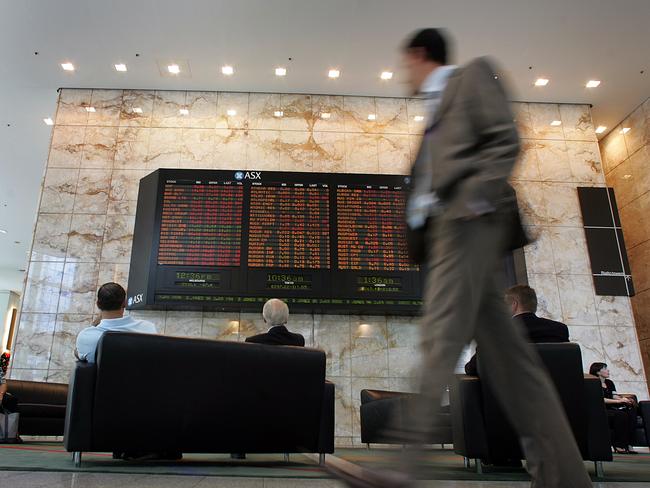
While falling earnings per share may not be a good look, Macquarie says it isn’t a market concern. They say catalysts for a valuation correction pose a bigger threat but they’re likely to be more externally driven.
The best reports, as Macquarie sees it, came from:
Airlines (Virgin and Qantas)
Gaming (Star Entertainment, Crown and Tatts Group)
Paper & Packaging (Amcor, Orora and Pact Group)
Miners (BHP and Fortescue)
Developers & Construction (Lend Lease and Boral)
Retail (Baby Bunting, JB Hi-Fi and Nick Scali)
Particularly interesting in today’s Macquarie note are the points on the industrial sector, saying the market has passed the maximum point of pessimism for domestic cyclical weakness.
“The ‘average’ industrial stock grew around 8 per cent – more than [twice] nominal GDP. There were no signs of balance sheet stress or funding concerns, earnings quality (cash flow) was strong and at the margin there was additional capital management.
“In aggregate, growth is not strong (FY16 come in at -3.4 per cent) but earnings are improving and we have passed the maximum point of pessimism for discounting domestic cyclical weakness.”
2.35pm:Hope for farmers as dairy prices rally
The dairy sector has reason to approach the back end of a tumultuous year with optimism as global dairy prices continue to rally.
Fonterra’s latest GlobalDairyTrade auction showed the broad price index leaping 7.7 per cent to $US2,920 ($3,805) per metric tonne.
The result drives the index to an 18-month high and comes after the prior two auctions delivered advances of 12.7 per cent and 6.6 per cent, respectively.
Daniel Palmer
More to come
2.05pm:Dick Smith CEO was ‘out of his depth’
Dick Smith Electronics failed because of poor strategy, leadership from the top and a breach of trust, according to one of its directors, Jamie Tomlinson, who also told the NSW Supreme Court he had pushed to replace chief executive Nick Abboud, reports Andrew White.
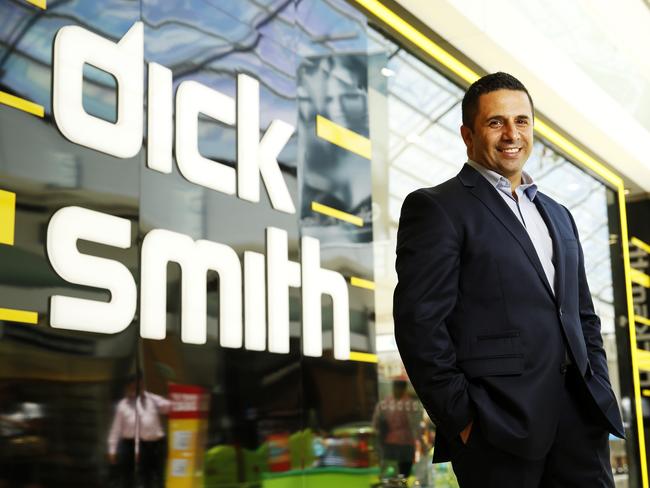
Mr Tomlinson, who joined the Dick Smith electronics board in April 2015, nine months before its collapse, said he was ready to resign by December because of the position the company was in with suppliers, inventory and cashflow.
“From the beginning of my time on the board I experienced a series of surprises which led me to believe that while he was a good retailer, he was out of of his depth as CEO,’’ Mr Tomlinson said of Mr Abboud.
More to come
2.03pm:QN paid for Palmer’s property search
Clive Palmer used his cash-strapped Queensland Nickel to pay his first boss and the refinery’s operations manager to investigate property developments such as golf courses and cattle stations, writes Sarah Elks.
Ian Ferguson, who employed a young Mr Palmer in his Gold Coast real estate firm in the 1970s, has told the Federal Court that he didn’t know how the Townsville refinery’s operations worked for an entire year after Mr Palmer employed him as operations manager of the refinery in 2012.
Read more
1.50pm:Save your rate cuts, RBA
Take the rest of the year off, RBA, your cutting should be done… For now. That’s what a long list of economic data and today’s GDP print are telling RBC Capital’s head of Australian and NZ fixed income strategy, Su-Lin Ong.
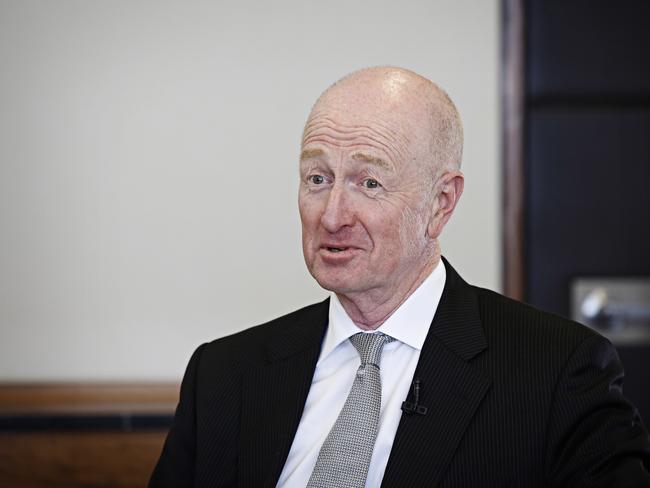
The modest headline GDP result of 0.5 per cent for the second quarter landed in line with expectations and adds to the argument that the RBA should save its bullets, according to Ms Ong.
“The GDP print masks some slightly firmer national income and nominal GDP measures, which we continue to think are better indicators of the underlying health of the economy,” Ms Ong said.
“These details of the accounts are consistent with the emerging narrative that the maximum drag on the economy from the terms of trade (and capex) adjustment is probably behind us.
“Key in the policy debate over the last few years, this is consistent with our base case for the RBA to remain on the sidelines for the rest of the year.”
RBC says wage and unit labour costs indicators support the Bank’s easing bias and Su-Lin Ong sees an interest rate cut coming in the second quarter of 2017.
1.34pm:GDP halts ASX gains
The local market has given up almost all this morning’s gains after today’s crucial GDP data fell in line with expectations, giving investors little to get excited about.
At 1:20pm AEST the S&P/ASX 200 was just 0.1 per cent higher for the day at 5421.2 points, noticeably lower than the 0.5 per cent it gained at the open.
Westpac is the star performer on the heavy end of the index, up 1.6 per cent, while CBA gains 0.7 per cent, BHP adds 0.6 per cent, and Telstra edged 0.4 per cent higher.
ANZ and Rio Tinto are flat, while NAB tiptoes up 0.2 per cent.
Estia Health is still ripping higher following a savage six-day sell-off cost the aged care company more-than half its market value, Estia is now 10.9 per cent for the day, albeit from significantly lower base.
Gold miners are jumping, with Northern Star, Evolution Mining, Regis Resources and St Barbara all gaining more than 5 per cent.
On the negative side of things, Santos is the worst performer today with a 3.9 per cent loss.
1.11pm:Iron ore exports lift in August
Iron ore exports from Australia’s Port Hedland increased by 11 per cent in August compared to the previous month, according to the latest data from the local port authority.
Cargoes of iron ore leaving Port Hedland, the world’s largest iron-ore shipping hub, totalled 42.9 million metric tons last month, versus 38.7 million in July, Pilbara Ports Authority said in a report.
Exports to China, the number one buyer of the steelmaking commodity, rose to 35.4 million tons from 32.5 million tons the month earlier, according to the port authority data.
Shipments destined for Japan and Korea were also higher on-month, it said.
12.39pm:Oil market hopes farfetched
The initial excitement over the G20 agreement between Saudi Arabia and Russia to co-operate in a bid try to stabilise the oil market started to evaporate overnight, as a more realistic assessment of the implications of the agreement started to emerge,writes Stephen Bartholomeusz.
In effect, the market concluded that the co-operation agreement, which includes the establishment of a working group between the world’s two largest producers, was not that much different to the succession of failed attempts to agree to freezes or caps on production that have been put forward ever since the oil price cracked in 2014.
The likelihood of the OPEC producers and those, like Russia, on its periphery agreeing to freezing or even reducing production at the informal OPEC meeting (which Russia will attend) in Algeria later this month is regarded as small — and irrelevant.
With the key producers, other than Iran and the Saudis, already producing at, or very close to, capacity, a freeze or cap at current levels wouldn’t alter the supply-demand levels. Read more.
12.05pm:Prius sales sink on cheap fuel
Toyota’s latest Prius hybrid has a problem: fuel prices.
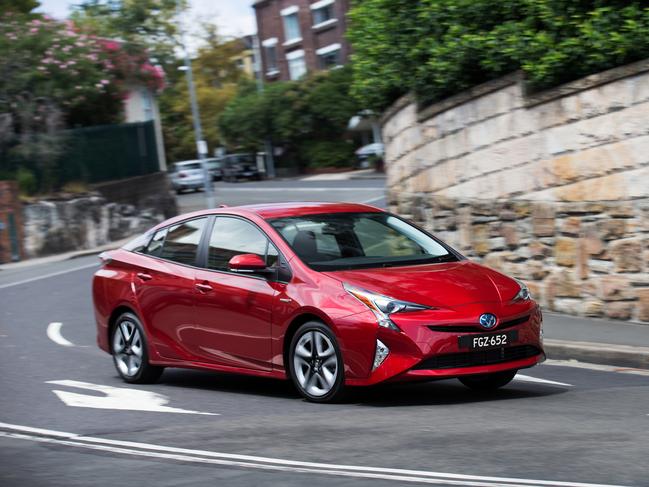
When the Prius first went on the US market in the late 1990s, it was a hit among celebrities like actor Leonardo DiCaprio who flaunted their environmental bona fides with the hybrid gas-electric car.
The latest version, which hit roads in December last year, is more fuel-efficient than ever, getting 54 miles to the gallon (23km per litre). In Toyota’s home market of Japan, it tops the sales charts. But it is struggling in the US as relatively cheap fuel prices dent the car maker’s strategy of presenting itself as the leader of an environmentally-friendly future — with the Prius as the vanguard.
US sales of the Prius are down 26 per cent this year through August.
Dow Jones
Read more
11.35am:25 years without a recession
Australia has marked 25 years without a recession with annual growth rising at its fastest clip in four years.
Official numbers from the Australian Bureau of Statistics revealed seasonally adjusted GDP growth of 0.5 per cent for the second quarter and 3.3 per cent for the 12 months to June 30.
This fell exactly in line with market expectations, despite the quarterly reading slowing sharply from March’s sharp 1.1 per cent jump.
The Australian dollar edged down on the data, slipping 0.1 of a cent to US72.6c at 11.33am (AEST) but largely clinging to gains realised overnight as soft US data raised doubts about an imminent US rate hike.
Daniel Palmer
Read more
10.58am:Fairfax-NZME strike deal
Fairfax Media has put pen to paper on a formal deal to merge its New Zealand operations with APN News & Media spin-off NZME.
Daniel Palmer reports the long-mooted deal is currently in the midst of an extended review from the New Zealand Commerce Commission, with the exact nature of the tie-up revealed today through the signing of a merger implementation agreement.
The two parties said the merger would see NZME acquire all of the shares in Fairfax NZ, with the latter to receive $NZ55 million ($53m) in cash and a 41 per cent shareholding in the enlarged company.
More to come
10.40am:Bargain hunters chase aged care stocks
Australia’s smashed-to-smithereens aged care stocks have rallied in early trade following a six-day meltdown that clearly left some brave investors seeing some value.
Estia Health — a shadow of its former self after dropping as much as 56 per cent in six sessions to a record-low $2.17 — opened 7.5 per cent higher today at $3.10 and has now jumped 44.5 per cent in three days (albeit from a much, much lower base).
Meanwhile Japara Health Care fell as much as 36.6 per cent in six days but has now rebounded almost 29 per cent in three days to $1.94, again, from a much lower base.
Anyone who picked the low will be high-fiving today but the regulatory cloud hanging over the sector remains a minefield for investors.
10.29am:Stocks struggle for direction
The Australian sharemarket was struggling for direction in early trade as investors eyed a mixed lead from offshore markets and a boost to commodity prices from a slumping US dollar.
At the 10.15am (AEST) official market open, the benchmark S&P/ASX 200 index rallied 6.3 points, or 0.12 per cent, to 5,419.9, while the broader All Ordinaries index edged up 7.5 points, or 0.14 per cent, to 5,517.9.
The big miners set the tone for the modest gains as BHP Billiton lifted 0.2 per cent to $20.60, Rio Tinto rose 0.3 per cent to $43.67 and Fortescue jumped 1.9 per cent to $5.27.
Gold producers outperformed after a strong 2 per cent advance in the price of the precious metal, with Newcrest and Regis Resources surging 3.5 per cent in early deals.
Daniel Palmer
10.24am:House building slumps in August
A big fall in house building pushed the entire construction sector into contraction in August.
The Ai Group and Housing Industry Association Performance of Construction Index fell 5.0 points to 46.6 points in August, from 51.6 points in July. With a level below 50 points, it indicates activity in the sector is winding down.
The biggest mover was house building, which slumped 13.8 points to 41.1 points in August.
Read more
10.15am:UBS positive on Qube
Qube Logistics is only part way through a complicated multi-year transition but UBS likes what it sees.
Analysts have upgraded the company to buy from neutral and beefed up the 12-month price target to $2.90 from $2.40.
Recent acquisitions will cause lower near-term earnings and cashflow forecasts but higher long-term value, UBS’ Simon Mitchell says.
“We expect Qube to emerge with a better quality earnings mix (Ports & Bulk drops from 60 per cent to 25 per cent) and superior earnings growth (we forecast 10-15 per cent pa EPS growth for FY19-25E),” Mr Mitchell and the UBS team said.
Two weeks ago Qube booked a 5 per cent fall in full-year profit and the stock has now dropped 10.5 per cent in 10 days to last trade at $2.39.
10.05am:How much Aust farmland China really owns
Treasurer Scott Morrison says he hopes the release of the agricultural land register, which shows Chinese investors own less than half a per cent of Australian farmland, will result in a more informed debate about foreign ownership.
The Turnbull government today released the first report from the land register, showing foreign investors hold 13.6 per cent of all Australian agricultural land, Rachel Baxendale reports.
More than 80 per cent of investment takes place through leasehold, with 52 per cent of foreign-owned agricultural land held by UK investors.
The countries with the next largest shares are the US, Netherlands, Singapore and China, which holds just 0.38 per cent of Australia’s agricultural land.
9.47am:Market ‘too pessimistic’ on Flight Centre
Recent selling pressure on Flight Centre has been overplayed and the beaten-up travel agent is showing “a compelling opportunity”, according to UBS.
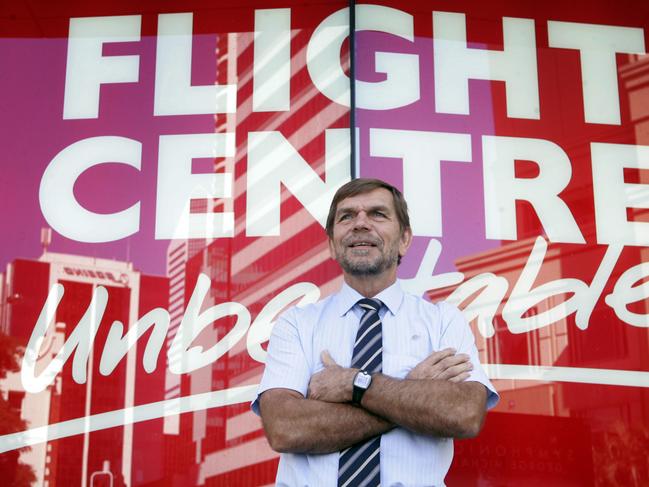
“For the past 10 years the market has questioned the sustainability of Flight Centre’s business due to the growing share of online travel agents and the costs associated with its (around) 2,900 store fleet,” analysts, led by Ben Gilbert, said.
“These concerns have been exacerbated more recently as airfare deflation, slower outbound travel, expansion of low-cost carriers and geopolitical events have impacted industry TTV growth.
“We believe the market is now pricing in these issues into perpetuity. In our view these are mostly cyclical and not structural issues. While there is some near-term uncertainty, we believe FLT is well positioned to grow earnings medium term as the market normalises.”
The travel agent’s stock has dropped almost 11 per cent in the year to date to last trade at $35.63, compared with a 2.2 per cent rise from the broader ASX200.
The analysts say Flight Centre is currently trading at 11 times forward price-to-earnings, against a market median of 20 times, which theoretically puts the stock at a cheaper level than the average.
Other analysts, however, are nowhere near as confident as Mr Gilbert and his team, with Bloomberg data showing only three ‘buy’ ratings on the stock, eight ‘hold’ recommendations and two ‘sells’.
The consensus 12-month price target is $36.77, which is 3.2 per cent above the last traded price.
9.25am:Morrison’s missing the point on super
The superannuation debate isn’t going away any time soon. Today, Robert Gottliebsen writes that Scott Morrison is being distracted from the real goal of superannuation reform.
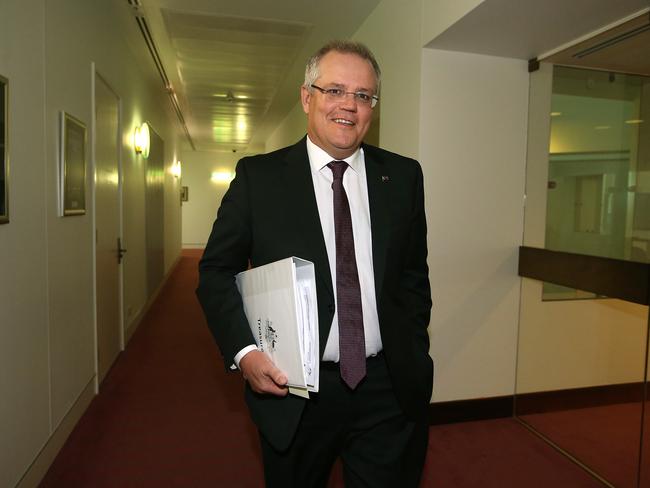
Here’s a taster of Gottliebsen’s view:
The superannuation debate should not just be about a grab bag of measures to cut current costs but a debate about how we fund the retirement of our ageing population and how we can avoid creating a crippling government pension bill.
It’s time Scott Morrison got some new advisers on superannuation. His current mob of advisers have too many people who have seen their nest gold-plated with future pensions worth between $5 million and $10m. The cost of those defined benefit pensions is rising by $6 billion a year and there is a $400bn to $600bn shortfall. That’s where the big problem is.
The latest set of statements by the Treasurer confirms that somehow his gold-plated advisers — we will call them the $10m club — have restricted his understanding of the broader issues covering the government pension to the wider community and the gold plating occurring in relation to older public servants (Morrison needs to do more on reining in public service pension rorts, August 25).
Read more
9.02am:Aged-care cuts could slug taxpayers
Taxpayers would be forced to foot the bill to return residents’ aged-care deposits if a provider fell into financial distress — an increasing concern as funding cuts hit the sector, Sarah-Jane Tasker reports.
Australia’s aged-care operators have been forced to update funding models after a series of changes to how the federal government funds the sector.
The three listed Australian aged-care companies lost almost $400 million of their value earlier this week, with their shares savaged when details about the fees they can charge were released into a market already jittery around cuts to aged-care funding.
Read more
8.40am:Stocks set to ease into the day
Aussie stocks look set for a flat start to the session as investors chew through the latest vanilla RBA statement and search for value following a rough week of selling.
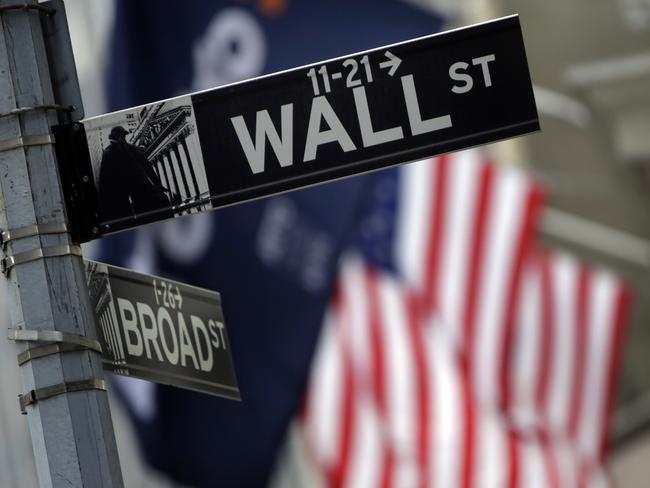
So far this week the market has bounced back, trading 0.8 per cent higher over the last two sessions following last week’s nasty 2.6 per cent sell-off.
The SPI 200 is pointing to a flat open from stocks, as are fair value indicators.
Banks saw healthy buying activity on Monday buy cooled yesterday as the RBA predicably left interest rates on hold and but pointed to growing apartment supply in the housing market.
Keep an eye on Origin Energy this week, with The Australian’s DataRoom reporting the announcement of a new CEO is imminent. Grant King’s replacement could be known by the end of the week.
Iron ore and oil prices remained steady overnight but miners could be in for a better session that expected.
Weak US services data weighed on Wall Street, which will likely filter through to the local session but there is some reason for optimism, according to IG market analyst Angus Nicholson.
“US equities did not take the data miss well, the only winners were commodity-related stocks and the yield plays such as utilities and telecoms,” Mr Nicholson said.
“This does not set the Asia-Pacific session up for a great open with most markets looking to open lower. Although in Australia the materials and energy space are set for a good day.
“BHP’s ADR gained 3.2 per cent and CBA’s gained 2 per cent, which actually points to potentially a better session today than the SPI futures are currently suggesting.”
7.45am: Dollar heading for US77c
The Australian dollar has risen on the back of disappointing US services data and market expectations of strong local GDP figures.
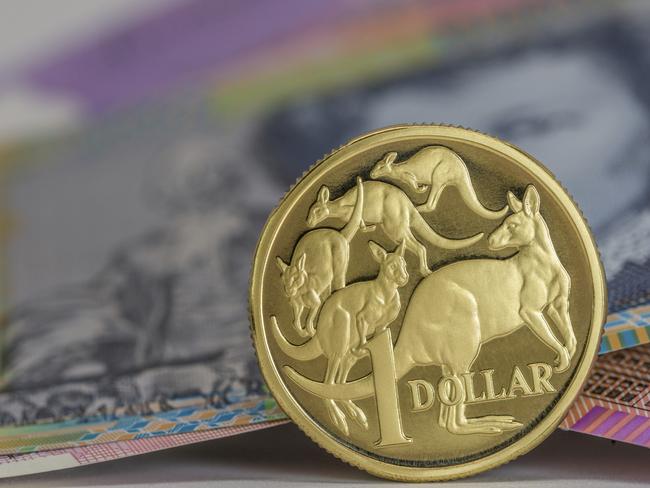
At 7am (AEST), the local unit was trading at US76.88 cents, up from US76.39 cents yesterday.
Westpac senior market strategist Imre Speizer said the US dollar and US bonds fell sharply in response to disappointing US services data, which showed the sector slowed expansion in August missing market forecasts of an uptick.
“Coming in the wake of last Friday’s disappointing payrolls report, it led markets to reduce expectations of higher Fed policy (Federal Reserve interest) rates,” he said in a note.
“The US dollar-led upside break last night has swung momentum (for the Aussie dollar) to positive, 77 US cents now vulnerable.”
7.15am: Australian market set to open lower
The Australian market looks set to open lower after Wall Street closed slightly higher after US data renewed expectation the Federal Reserve may not to lift its key interest rate in the near future.
At 6.45am (AEST) the share price index was down 10 points at 5,5401. Locally, in economic news today, the Bureau of Statistics releases the national accounts, including gross domestic product data for the June quarter and international trade in goods and services for July.
The Australian Industry Group/Housing Industry Association is expected to release its performance of construction index for August.
In equities news, AGL chief executive Andy Vesey is slated to speak at a CEDA event in Brisbane.
In Australia, the market fell yesterday, hurt by falls across financial, telecom and resource companies as the Reserve Bank of Australia left interest rates unchanged.
The benchmark S & P/ASX200 index was down 16 points, or 0.29 per cent, at 5,413.6 points.
The broader All Ordinaries index was down 14 points, or 0.25 per cent, at 5,510.4 points.
7.10am:Iron ore ebbs, coking coal fires
The iron ore price has slipped again, as it remains under pressure from a short-term, localised interruption to industrial activity in China and broader plans to reduce a global steel glut.
Iron ore lost 0.3 per cent to $US58.60 a tonne overnight, according to The Steel Index, from $US58.80 the previous day. It has risen for only two of the past 10 trading sessions.
By contrast, another steelmaking ingredient, coking coal, has rallied, with prices soaring 51 per cent since the start of last month.
Read more
7.05am: Fox settles Carlson suit
21st Century Fox said it has settled a lawsuit with former anchor Gretchen Carlson, whose allegations that former Fox News chief Roger Ailes sexually harassed her led to his exit from the company.
Terms of the settlement weren’t disclosed, but a person familiar with the settlement said its value was in the range of $US20 million. This person also said a “handful” of settlements with other women who came forward alleging harassment have also been reached.
Read more
7.00am:Dollar rises after RBA
The Australian dollar has continued its ascent against the US dollar after the Reserve Bank of Australia held its cash rate steady and the nation’s terms of trade lifted.
At 6.35am (AEST), the local unit was trading at US76.85 cents, up from US76.39 cents yesterday.
6.50am:OPEC cautious on further cuts
OPEC members face a dilemma in the run-up to a new round of oil-production talks later this month: They want to boost crude prices to raise their revenue, but they don’t want to send prices so high that North American shale-oil producers will lift their output.
The result, say officials from members of the Organization of the Petroleum Exporting Countries, is that the cartel is unlikely to make significant production cuts when it meets in Algiers beginning Sept. 26.
Read more
6.45am:Oil prices buoy Wall St
Energy companies led gains in US stocks overnight as oil prices rose.
Expectations that underwhelming economic data would push the Federal Reserve to delay raising interest rates also drove action in the markets after data showed slowing growth in the US service sector.
The Dow Jones Industrial Average added 46 points, or 0.3 per cent, to 18538. The S & P 500 gained 0.3 per cent, and the Nasdaq Composite rose 0.5 per cent.
European shares finished mixed, as investors worried about the disappointing US data. But the Australian share market is set to fall this morning, with ASX futures down 9 points at 6.30am (AEST).
Read More


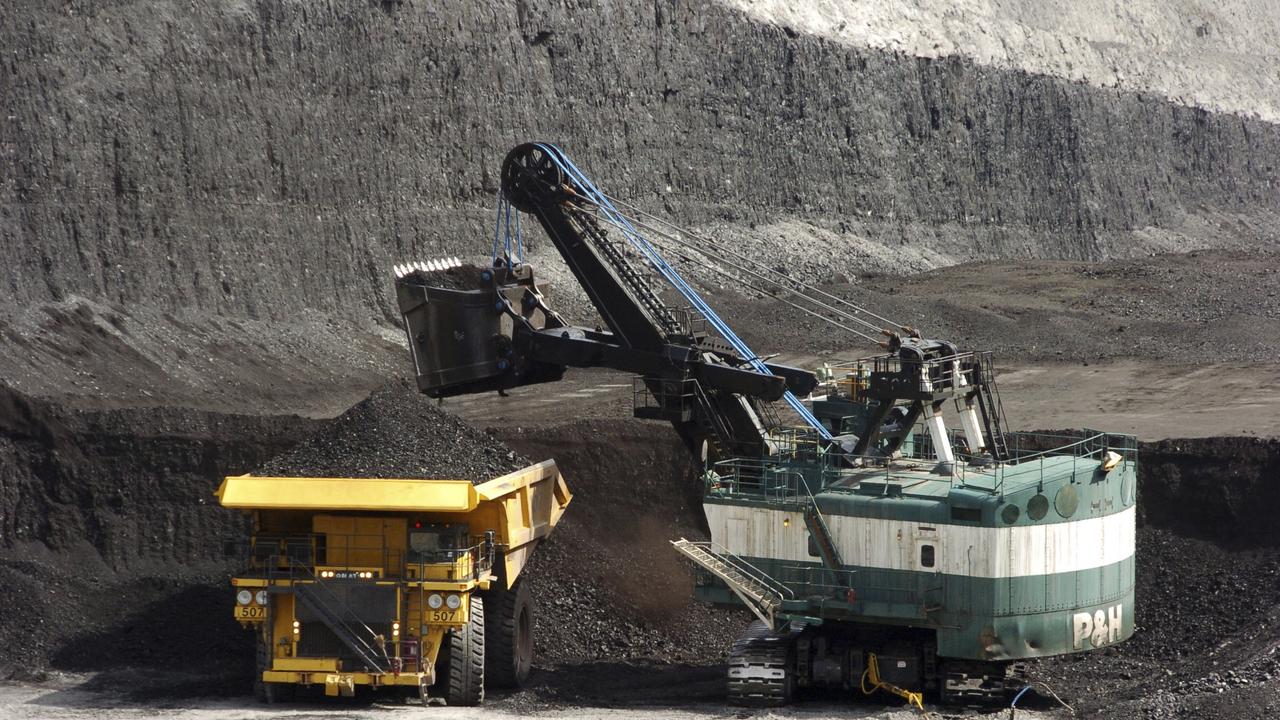
To join the conversation, please log in. Don't have an account? Register
Join the conversation, you are commenting as Logout